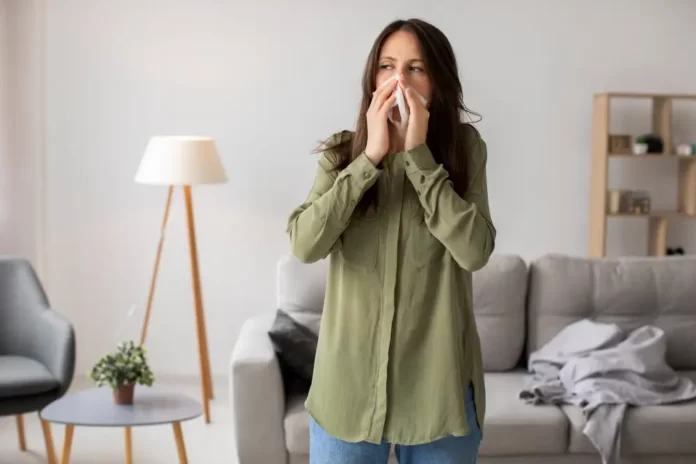Finding that your house smells like gas when there’s no leak can be really worrying. You might wonder, “What’s going on?” Don’t worry, this guide is here to help clear things up. We’re going to talk about why your house might smell like gas even when there isn’t a leak. You’ll learn about different gas smells and what else might cause them. Plus, we’ll share some easy steps on what to do if this happens to you. So, let’s dive in and solve this gas smell puzzle in your home.
Types of Gas Smell in House
When you notice a gas smell in your house, it’s necessary to understand what type of odor it is, as this can give you clues about its source. Here are a few gas smells you might notice in your home:
- Rotten Egg Smell: This is the most typical gas smell in homes. Natural gas is odorless, so utility companies add a substance that smells like rotten eggs to make it easy to detect a leak. If you smell this, it’s a sign to be cautious and check for leaks.
- Chemical-like Odors: Sometimes, the smell might not be exactly like rotten eggs but more chemical-like. This could be due to various household items like cleaning agents, paint, adhesives, or even certain types of plastic and rubber materials that emit a distinct chemical odor. These smells might trick your nose into thinking there’s a gas leak.
- Musty or Earthy Smells: In some cases, you might notice a musty or earthy odor. While these aren’t typically associated with gas, they can sometimes be mistaken for gas odors. These smells are often related to mold, mildew, or dampness in the house.
- Metallic or Burning Smells: Occasionally, a metallic or burning smell might be confused with a gas odor. These can come from electrical problems, overheated appliances, or even your HVAC system working overtime.

5 Reasons Why Your House Smells Like Gas But No Leak
If your house smells like gas but there’s no leak, it might be confusing. Here are five simple reasons why this could happen:
1. Leftover Smells from Gas Appliances
Have you recently used your stove or other gas appliances? Sometimes, they can leave a gas smell that hangs around for a bit after you’ve turned them off.
2. Smells from Household Products
Common items like paint, cleaning fluids, or glue can smell surprisingly like gas. They contain chemicals that give off strong odors, which can be mistaken for a gas leak.
3. Odors from Your Drains
That gas smell might be coming from your drains. If your plumbing isn’t working properly, sewer gases can escape into your house. These gases have a methane-like smell, often confused with natural gas.
4. Electrical Issues
Sometimes, electrical faults in your home can create a smell that’s a lot like gas. Overheated wires or malfunctioning electrical appliances can give off a unique, sharp odor.
5. Decaying Organic Material
Unseen rotting food or other organic materials, either inside or around your house, can produce a sulfurous smell. This kind of smell is often similar to gas and can be mistaken for a leak.
Knowing these reasons can help you pinpoint why there’s a gas-like smell in your house, helping you to address the issue more effectively.
What to Do When Your House Smells Like Gas Without Any Leak?
If you smell gas in your house but can’t find a leak, it’s important to stay calm and take some safety steps. Here’s what you can do:
1. Let Fresh Air In
The first thing to do is open all your windows and doors. This helps get rid of the gas smell by bringing in fresh air.
2. Check Your Gas Appliances
Go around your house and make sure all your gas appliances are turned off properly. Sometimes, things like your stove might not be completely turned off, and that can cause a gas smell.
3. Look for Common Smell Sources
Think about what might be causing the smell. Have you used any paint, cleaning products, or glue recently? These can sometimes smell a lot like gas.
4. Inspect Electrical Appliances
Sometimes, electrical problems can create a smell that’s a bit like gas. Check for any overheated or malfunctioning electrical devices.
5. Check Outside Your House
The smell might be coming from outside. See if there are any outside sources like construction work or traffic that could be bringing the gas smell into your house.
6. Call for Help if Unsure
If you’ve done all this and still can’t find the source of the smell, or if the smell is very strong, it’s a good idea to call a professional. They can check your house more thoroughly to make sure everything is safe.
Remember, it’s always better to be safe than sorry when it comes to gas smells in your house!

What Smells Similar to Gas
Sometimes, the smell in your house might seem like gas, but it’s actually coming from everyday things. Here’s a bit more about what could be causing these smells:
- Ammonia and Bleach: These are common cleaning agents found in many homes. They can create a really sharp and strong smell. If you’ve been cleaning recently or if a bottle is open somewhere, this might be why you’re noticing a gas-like odor.
- Paint Thinners: These are used in painting or varnishing and have a very distinct chemical smell. If you’ve been doing some DIY work or have an open can of paint thinner, it could be the source of that gas-like smell in your house.
- Spoiled Food: Old or rotting food, especially things like vegetables or eggs, can give off a sulfurous smell, which is quite similar to gas. Check your kitchen or any place where food might be stored to see if something has gone bad.
By identifying these common household items, you can better pinpoint the source of any gas-like smells in your home.
You may also like to Read: How to Make Carpet Fluffy Again
Signs of a Natural Gas Leak in a House
Even though we’re talking about situations where there’s no leak, it’s still important to know how to spot a real gas leak. Here are some signs to look out for:
- Hissing Sound: If there’s a leak in a gas line or an appliance, you might hear a hissing or whistling sound. This is the sound of gas escaping and it’s a clear warning sign. Check near your gas appliances or where the gas lines run in your house.
- Visible Damage: Take a look at your gas lines and connections. If you see any cracks, breaks, or other damage, this could be where the gas is leaking from. This includes the gas pipes, connectors, and the appliances themselves.
- Physical Symptoms: Pay attention to how you and others in your house are feeling. Symptoms like feeling dizzy, nauseous, or having headaches can be signs of exposure to natural gas. These symptoms are especially important to notice if they get better when you leave the house and come back when you’re inside.
Conclusion
Finding out why your house smells like gas when there isn’t a leak can be confusing. But now you know it could be from things like leftover smells from your stove, strong smells from cleaning stuff, or even gases from your drains. Always remember, if you’re not sure what’s causing the smell or if it’s really strong, it’s best to call someone who can help, like a gas company or a plumber. Keeping safe is the most important thing. With this info, you can feel more at ease and keep your home a happy and safe place.
FAQs
What should I do immediately if my house smells like gas?
First, ensure safety by ventilating the area – open windows and doors. Check if gas appliances are turned off. If you can’t find the source and the smell is strong, evacuate the house and call emergency services or your gas company from a safe distance.
Can a gas smell in the house be harmful to my health?
A gas-like smell, depending on its source, can be harmful, especially if it’s an actual gas leak. Exposure to natural gas can cause symptoms like dizziness, nausea, and headaches. If the smell is due to other substances like chemicals, these can also be harmful with prolonged exposure.
How do I check for a gas leak in my house?
Listen for a hissing sound near gas lines or appliances, check for visible damage to gas pipelines or connections, and be aware of physical symptoms like dizziness or nausea. For a thorough check, consider using a gas leak detector or call a professional.
What are common non-leak sources of a gas smell in the house?
Common sources include leftover smells from gas appliances, odors from household products (like paint or cleaning agents), and sewer gases from plumbing issues. Electrical faults and decaying organic material can also mimic a gas smell.
How can I prevent false gas smells in my house?
Regularly maintain your gas appliances and plumbing to prevent residual odors and sewer gas leaks. Properly store and use household chemicals to avoid their odors being mistaken for gas. Also, keep your living areas well-ventilated to disperse any potential smells.







